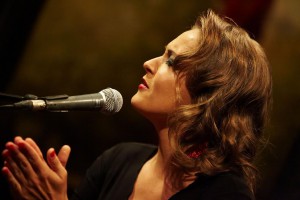Vocal Expression of Contemporary Stage Performers: A Correlation with the National Ethnic Vocal Traditions
Doctoral student: Brigita Bublytė
Supervisors: Prof. Jonas Vaitkus, Assoc. Prof. Dr. Ramunė Balevičiūtė
Consultant: Prof. Habil. Dr. Daiva Vyčinienė
Department: Acting and Directing
Intended duration: 2014-2018
Abstract
The research part of the present artistic doctorate project attempts to discover the common elements of vocal expression that exist in the ethnic vocal traditions of different nations and in the creative activity of a contemporary performer. It aims to reveal the phenomenon of voice as a dual function and a dual product – speech and music.
The author of the project looks at the global and Lithuanian vocal traditions and at the theories and practices of the 20th and the 21st centuries related to vocal expression. Analysis of sutartinė, flamenco, dhupad de cante, canto difonico and pansori is specially focused on four elements of vocal expression: breathing, the resonator system, vocal cords and the articulation system. The research paper then examines how these elements function in the expression of a contemporary stage performer and what is the difference between vocal expression in a naturally living ethnic environment and in an artistically organised situation of a play.
The research also structures and communicates the personal experience of the author as creator and educator. It looks at issues of concern when it comes to working with the voices of actors and singers and underlines the importance of voice as one of the key elements of expression for stage performers.
The creative part of the artistic project is a play where the Lithuanian sutartinė blends with other types of ethnic tradition. A parallel between contrasting forms of ethnic musical expression aims to unveil the hidden beauty of cultures by preserving their key ethnic codes and discovering what is born from this communicative revelation. A one-person show is also underway.


